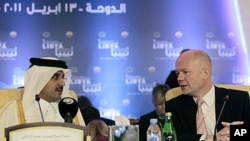Western and Arab diplomats have defended international military efforts in Libya and pledged to offer more monetary, political and humanitarian support for the Libyan opposition.
Diplomats from around the world met in Qatar Wednesday to coordinate an international aid response for the Libyan people.
Members of the so-called Libyan contact group include representatives from the U.S., Britain, France and other countries lending military support in Libya. They agreed in a final statement to look into a "temporary financial mechanism" to help the rebels access and manage funds.
After the meeting, Qatar's crown prince urged Libyan leader Moammar Gadhafi to step down in a way that is "wise" and "peaceful." He announced that Italy would host the group's next meeting during the first week of May.
British Foreign Secretary William Hague said the international community's actions to protect Libyan civilians caught in the country's bloody conflict are "necessary, legal and right." An international alliance has been providing military support through NATO-led airstrikes.
In Benghazi, a spokesman for the rebels' Transitional National Council told reporters there is a possibility that three nations could supply them with arms. He said discussions with these three nations were positive, but did not reveal which countries were involved in the talks.
Another rebel spokesman told delegates in Qatar that NATO is not doing enough to protect civilians. However, U.N. Secretary-General Ban Ki-moon defended the international community's efforts to suppress Gadhafi's military, saying the major powers have taken "decisive action" in Libya.
In Washington, the Pentagon confirmed Wednesday that U.S. fighter jets have been conducting strikes against Libya's air defenses during the past 10 days. Although U.S. officials had announced earlier that America's role in Libya was now one of support rather than active combat, a Pentagon spokesman, Colonel Dave Lapan, said the U.S. has transferred an unspecified number of fighter jets to NATO command to conduct air strikes as assigned.
NATO took over command of the operation over Libya from the United States on March 31. The alliance has carried out airstrikes against government forces in Libya to enforce a U.N.-authorized "no fly" zone and protect civilians from attack by Gadhafi's forces.
Witnesses near the Libyan capital heard loud explosions close to Tripoli's airport Wednesday, but little news has trickled out about fighting on the main eastern and western fronts.
In Berlin Wednesday, Germany expelled five Libyan diplomats for allegedly intimidating Libyan citizens living in the country. Germany's foreign ministry said the five must leave the country within a week.
French President Nicolas Sarkozy and British Prime Minister David Cameron plan to hold talks in Paris late Wednesday to discuss the Libyan crisis.
Some information for this report was provided by AP and AFP.




